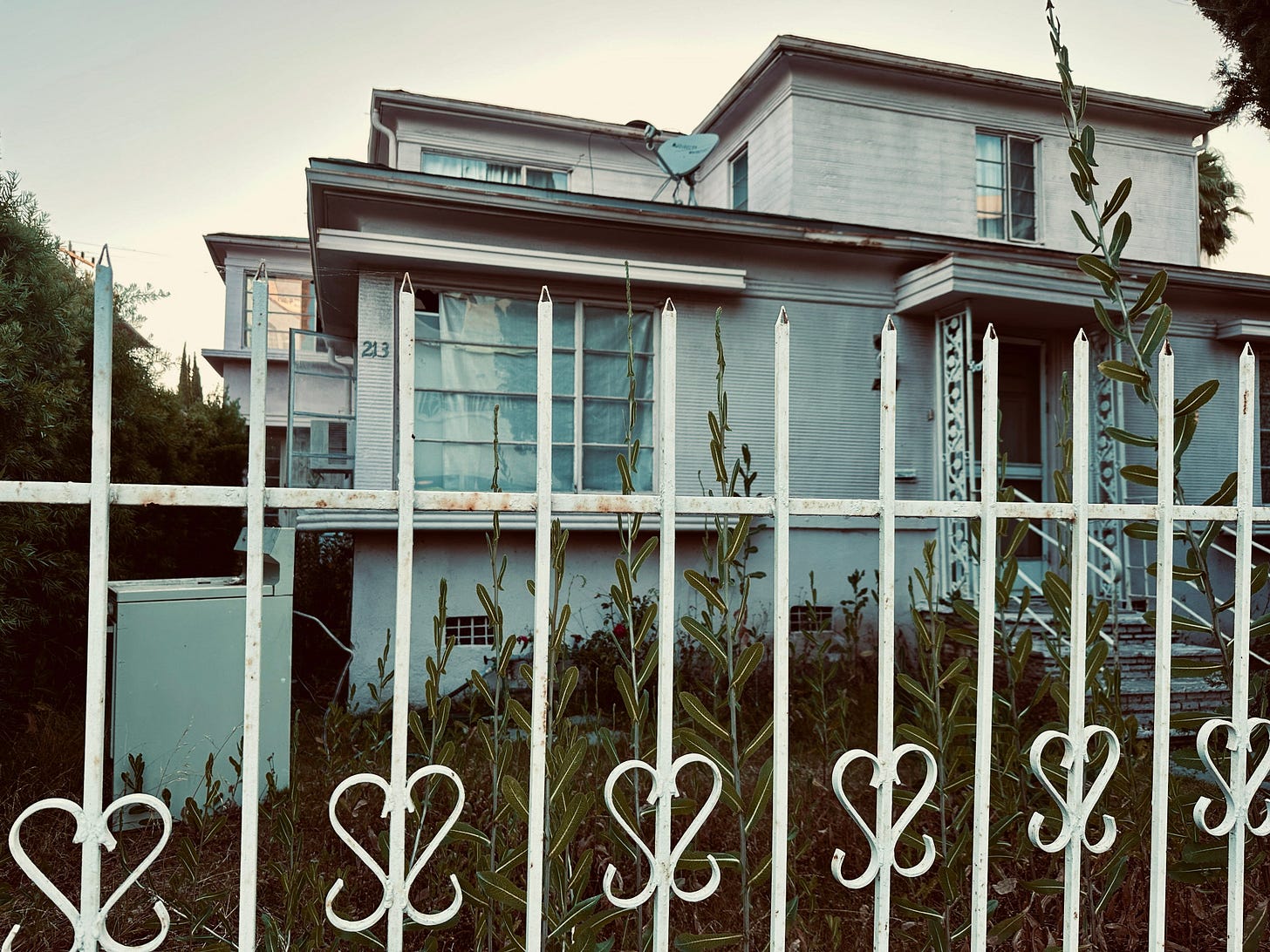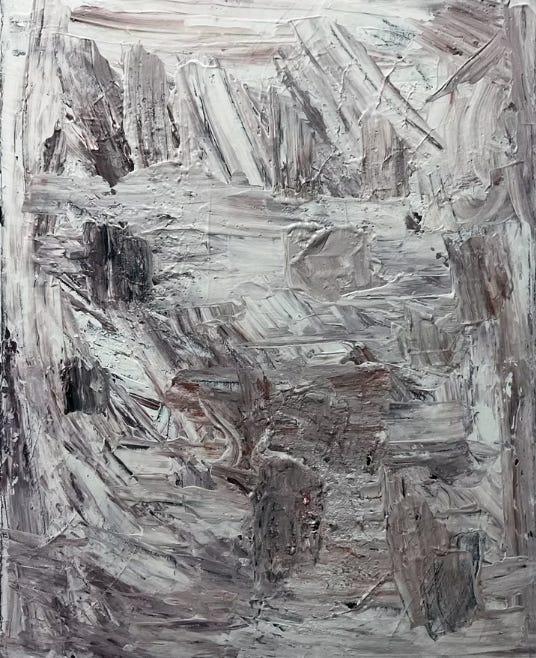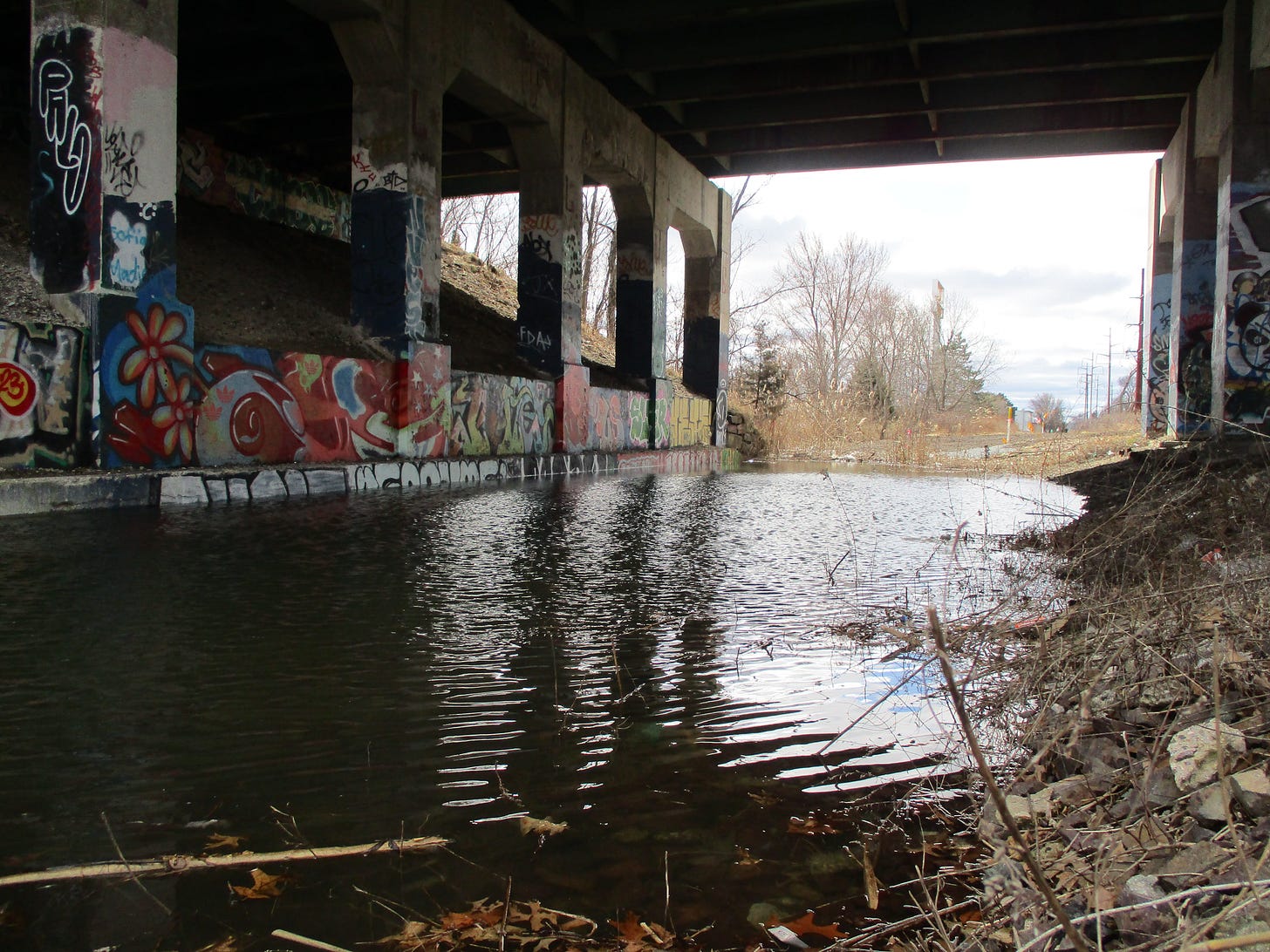Ekphrastic Poetry by Patrick G. Roland
“Gift for the Yateveo,” “Shed,” and “Bird of Judgement;” responses to work by artists Mirim Koh, Jennifer Shneiderman, and Harrison Zeiberg
Gift for the Yateveo Inspired by the photograph, Edge of Beverly Hills (2024) by Jennifer Shneiderman The hungry plant whispers as it hunts. Its roots dig deeper into the sidewalk. I press my hand to the brick spine of a house that once held me. I feel something move under my palm. Life? From a distance, the building slumps on splintered concrete. White paint flakes like eczema. A breeze pries away another layer. Above, a window grins with broken teeth, a moldy green curtain drools between them. I used to pretend the curtain was a jungle, hang action figures from its lime-green tendrils. I drag my hand across the house’s belly. It flinches. I feel my childhood injected with venom, consumed like a spider sipping the yolk from its prey. Nature doesn’t knock. It slips through cracks, seeds itself in mortar, topples what once felt secure. Vein-vines creep through doorframes, knot themselves around the rusted legs of chairs I once pulled up to a chipped kitchen table. Green leaves hide scratches on doorframes where my brother once carved his name with a butter knife. Ferns curl like tongues yearning for a kiss. I look past what my parents left behind— toward a city our parents abandoned. I slice my finger on a thorn rooted in the cabinet, Blood beads on the tile. Beneath me, the floor rumbles. The Yateveo gorges on the memories I tried to bury.
Shed Inspired by the painting, Skin (2022) by Mirim Koh After the binge, I awoke dirty and foreign. I felt remade in her image. The tattoos, piercings, braces, until my reflection returned a stranger’s sneer. No smile I recognized. I left before morning. On the stoop, a garter snake slid from its translucent sock, scales gashed by the neighbor’s cat, forgotten on the aluminum downspout. Would his kin know him, coiled back beneath her porch? Would he? I leaned into the car window, watched my pores scale over, heard a voice clang in my ribs, zipped inside my skin. I pinched a fold above my hip. Gripped the door handle. Peeled away the nose broken by her bar flirt, the tattoo she chose, the piercing she admired. I stripped it back, cell by scale. Excoriated. Salamander-slick. I stared into the car window, grinning crooked teeth, familiar now, two years in the making. A hide with no record: unscarred, unnamed, unclaimed. A faded gray mark— tattoo or bruise? Yes. I drove into the sunlight. It stung. Not like an iron, but a brand. Etching her out. Reclaiming what’s mine to mar. Or not.
Bird of Judgement Inspired by the photograph, Pond (2024) by Harrison Zeiberg A trail behind my house leads to a forgotten pond. I call it my pond. A black lark lives there, has for years. I call it my lark. I always walk there barefoot, hoping wet soil holds memories, hoping to absorb answers. I walk with eyes closed. Each step is a guess. I provoke the earth to remember me. Dare it to strike. But nothing gives. A root retracts. A stone slips aside like it’s seen me before. I want it—the wound, the shift, a truth. Love moved like that once, like a gulp of pond water that clogs your throat before you realize you’re drowning. Making you claw, scream, ache for reprieve. But I don’t flinch. Not anymore. I move on, dew-slick lungs burn, pulse slows. The darkness smirks under the crumbling bridge. My lark watches from her high gnarled perch, crouched like a judgment still forming. Her call carves a ruling into the flesh of the quiet. I don’t listen. I wait without anticipation, stare back at my accuser, now mounted on a much straighter branch reaching down, blocking my progress. She calls again, shrill and knowing. I do not answer. The bird edges closer, her branch bent to eye level. Her neck shorter, feathers now black-glossed. Not a lark at all but a magpie. Her beak opens—but no shriek. Instead, a judgment passes like a shiv between ribs. Not a call, but a verdict: Guilty— of not being guilty enough.
Author notes:
For the Edge of Beverly Hills, the dull colors and overgrown plants surrounding the house took me back to my friend’s childhood home where I spent countless hours learning to be me. When his house and many other houses on the street became abandoned, it felt like a piece of me was being reclaimed by nature and by the past. I still visit those vacant lots that are nothing more than partial foundations and vivid memories.
For Pond, the dreary backdrop and isolated waters are part of my weekly routine of trying to clear my mind of debris it has collected. Like the pond and graffitied bridge in the photograph, my mind tries to shake free remorse and guilt that have built up but always feel judged.
For Skin, the grays are how I used to see myself in my own skin. I felt absent of me and searched hard for what I used to be or who I thought I was. The painting left an impression on how the metaphorical idea of shedding an appearance and renewing oneself the way a reptile does is therapeutic in a way. It gives me confidence that no matter the past or hardships, some things can become a choice. It’s just a matter of following through.
Patrick G. Roland is a writer and educator living with cystic fibrosis. He explores life’s experiences through poetry and storytelling, seeking to inspire others in the classroom and through writing. His work appears or is forthcoming in Hobart, scaffold, Sacramento Literary Review, Maudlin House, Trampoline, and others.





